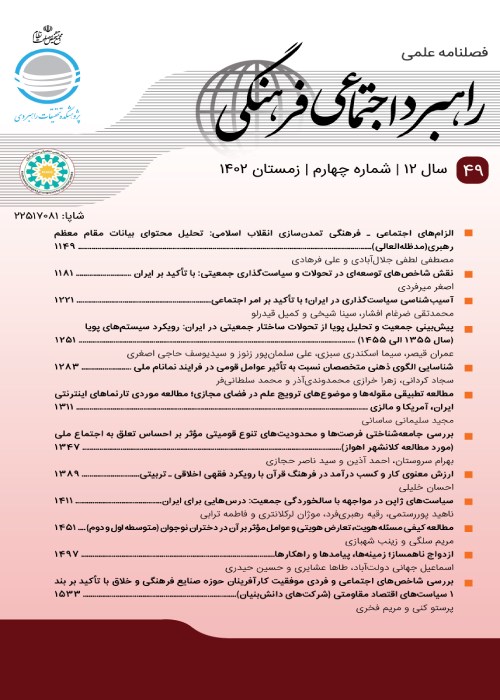Design and validation of an indigenous model of good governance based on religious teachings with a mixed approach
The aim of this study is to design an indigenous model of good governance based on religious teachings. The method of this study is mixed (qualitative-quantitative). Data collection in the qualitative part was done through systematic review of religious and historical documents and books and was analyzed by the data method of the foundation. 62 senior and middle managers of Mazandaran province were collected by census sampling method and tested by structural equation modeling method. From the analysis of qualitative findings, the conceptual model was designed in the form of 700 primary concepts, 59 sub-categories and 21 main categories. For qualitative validation and validation of the model; The method of confirmation of selected experts was used using the combined judgment and snowball sampling method (11 tons). Quantitative findings based on the obtained propositional propositions, in addition to confirming the validity of the measurement and structural models of the research model, the positive effect of causal conditions (competencies of managers, unity of direction between the main elements of the organization) on the phenomenon of good governance and positive effect Good governance over strategies (economic, political, cultural, human resources) was endorsed. Also, in addition to confirming the positive effect of contextual conditions (monitoring, culture building, consulting dynamics and knowledge-based management) and the negative effect of intervening conditions (corruption, betrayal and inefficiency of managers, putting pressure on people) on strategies, positive effect Strategies were approved on the results of good governance.
-
Designing a strategic model of human capital aligned with technology at the Iranian telecommunications foundation technology company
Fatemeh Faghih, Mojtaba Tabari *, Mohammadreza Bagherzadeh
Journal of Innovation Management and Operational Strategies, Summer 2025 -
Confirmatory factor analysis of organizational innovation model with emphasis on lean human resource management
Ebrahim Ghasemzadeh, Mohamadreza Bagherzadeh *, Seyed Ahmad Jafari Kelarijani, Ezzatollah Baloui Jamkhaneh
Journal of Teaching in Marine Sciences, Winter 2025 -
Presenting and explaining the job dependency model with the data theory approach of the foundation in the National Bank of Mazandaran province
Mohammad Reza Alijani Ganji, Mohammadreza Bagherzadeh *, Peyman Valipour, Saeed Emamqolizadeh, Mohammad Saeed Bagherzadeh
Iranian Journal of Political Sociology, -
Designing and explaining a good governance model for all public libraries in the country
MohammadSaeed Bagherzadeh, Mojtaba Tabari *, Toraj Mojibi, MohammadReza Bagherzadeh, Ali Mehdizadeh Ashrafi
Quarterly of Geography (Regional Planing),


